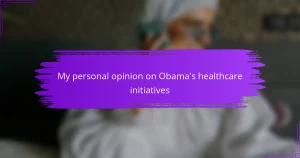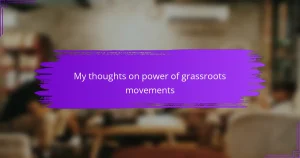Key takeaways
- Obama’s policies aimed to unite people through pragmatism and hope, significantly impacting healthcare and economic recovery.
- The Affordable Care Act offered vital insurance coverage, reshaping lives and creating a sense of community among supporters.
- Environmental and educational initiatives sparked important discussions, balancing immediate concerns with long-term sustainability.
- Active political engagement and collaboration are essential for meaningful policy change, emphasizing the importance of empathy and persistence.
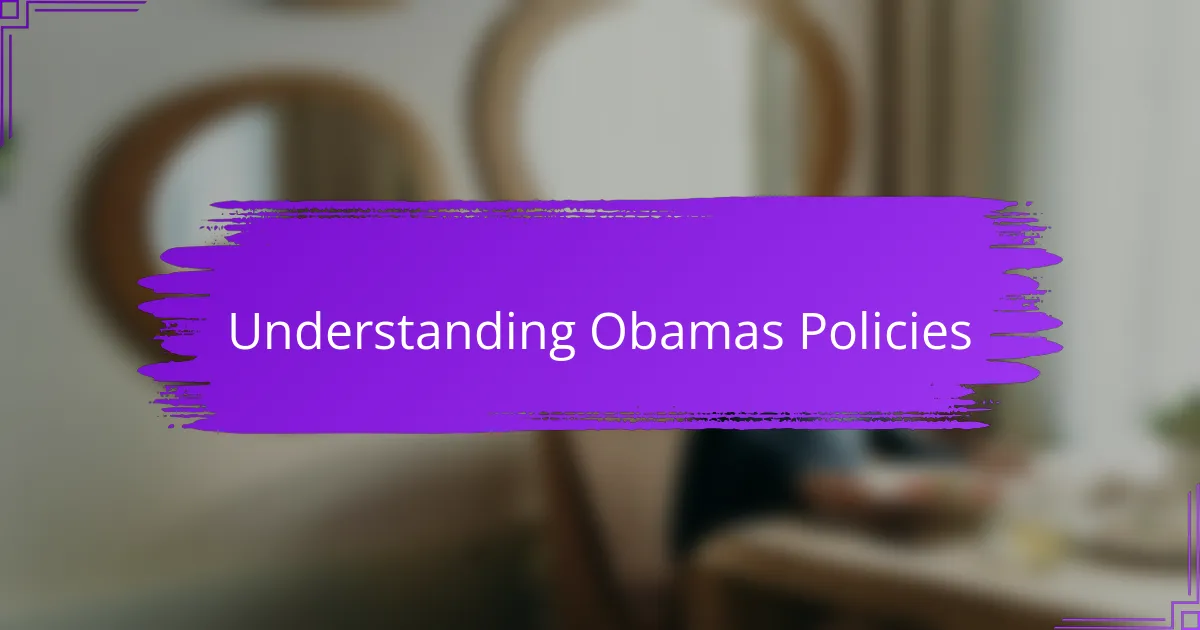
Understanding Obamas Policies
When I first dove into understanding Obama’s policies, what struck me most was their balance between pragmatism and hope. How often do politicians truly aim to bring people together rather than divide? This genuine effort made me curious to explore the details more deeply.
Take, for instance, his approach to healthcare. It wasn’t just about reforming a broken system; to me, it felt like a promise that no one should suffer due to lack of access to medical care. Have you ever wondered what it’s like to know millions gained that security under his leadership? That perspective added a human dimension to the policy for me.
Then there’s the economic policy, which in my experience wasn’t perfect but showed a clear focus on recovery after crisis. The painstaking steps to rebuild the economy told a story of resilience and determination, something I think many of us can relate to on a personal level. Understanding that made me appreciate the complexity behind these decisions.
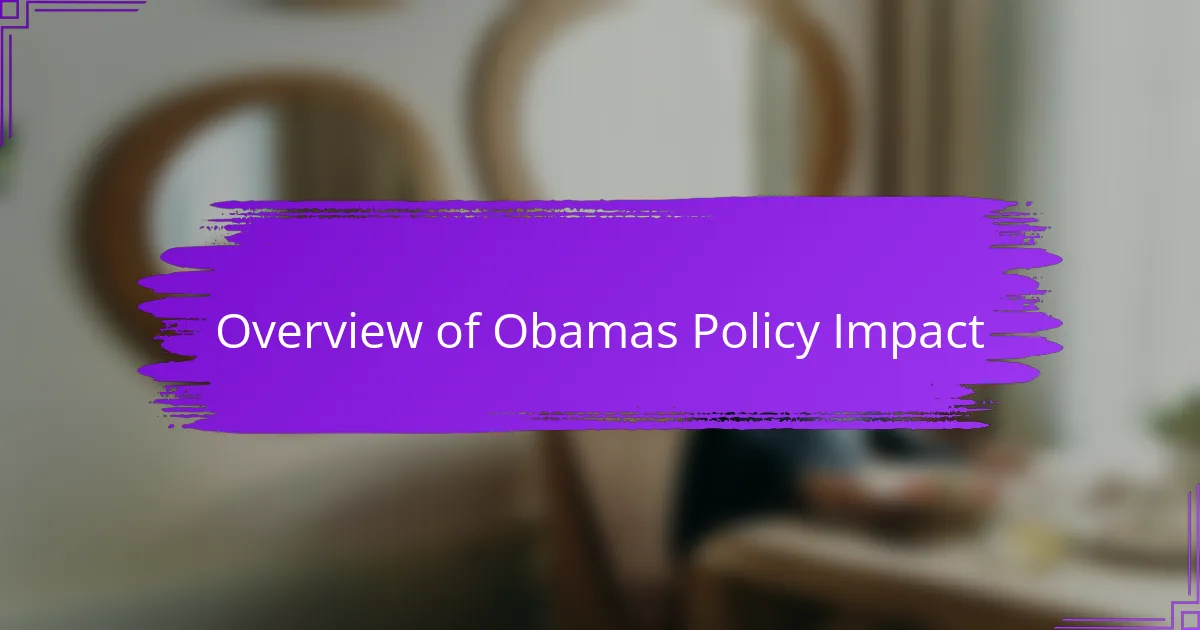
Overview of Obamas Policy Impact
Looking back at the overall impact of Obama’s policies, I see a blend of measurable progress and lasting change that still resonates today. Have you noticed how often his healthcare reforms come up in conversations about fairness and access? For me, it’s a reminder that policy can touch lives in deeply personal ways.
One thing that stands out is how his administration’s focus on economic recovery wasn’t just about numbers but about restoring hope for everyday families. I remember hearing stories from friends and neighbors who felt more secure in their jobs and homes—proof that these policies carried real-life weight beyond charts and statistics.
Of course, impact isn’t without its complexities. Sometimes I ask myself, could more have been done? Yet, even with the imperfections, I believe Obama’s policy legacy reflects a commitment to progress and unity that many of us still look back on with a sense of pride.
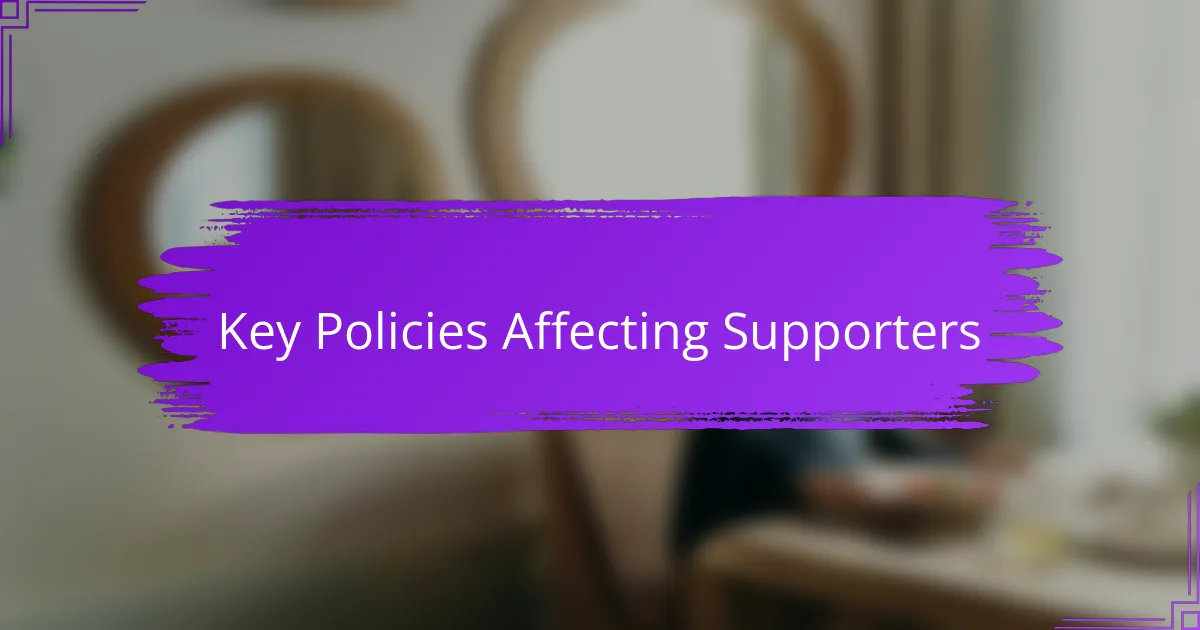
Key Policies Affecting Supporters
When I consider the key policies that directly affected us supporters, the Affordable Care Act stands out as a game-changer. It wasn’t just a bill; it was a lifeline for many people I know who had been struggling without insurance. Have you ever felt relief knowing a policy could actually protect your family from financial ruin due to medical bills? That’s the reality Obama’s healthcare reform created for countless Americans.
Another policy that hit close to home was the emphasis on clean energy and environmental protection. I remember conversations with friends in communities reliant on traditional industries—they were torn between economic fears and the promise of a sustainable future. How do you balance protecting jobs today with preserving the planet for tomorrow? Obama’s efforts sparked that very dialogue, and even if progress was slow, it felt like a crucial step forward.
Lastly, I can’t overlook initiatives aimed at education and student debt relief. Many supporters I’ve talked to see this as a direct investment in the younger generation’s future. Isn’t it encouraging to know policies existed that tried to ease that overwhelming burden? For me, this showed a compassionate side to governance that prioritized opportunity, not just immediate political gain.
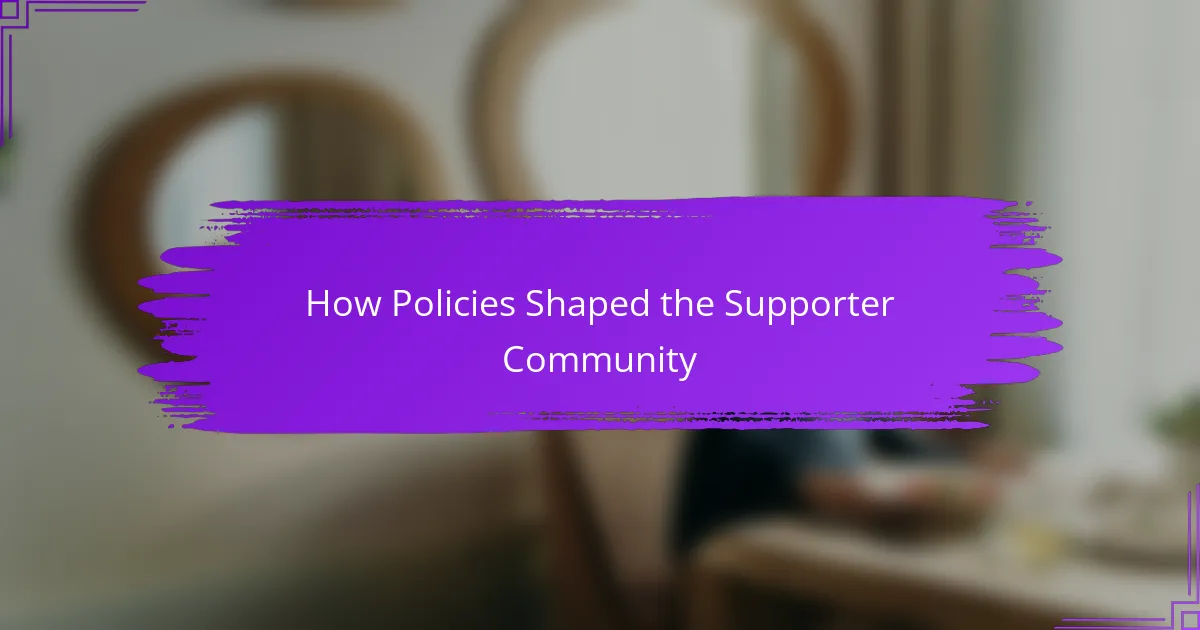
How Policies Shaped the Supporter Community
Policies aren’t just words on paper—they become part of our community’s identity. I’ve seen how the Affordable Care Act, for example, didn’t just change healthcare; it brought people together in a shared sense of security and hope. Did you ever notice how discussing these policies sparked friendships and a feeling of collective purpose among us supporters?
What struck me most was how environmental policies encouraged tough but necessary conversations within our community. Friends who depended on traditional jobs worried about change, yet many of us found common ground in wanting a cleaner future. Isn’t it fascinating how policies can both challenge and unite us at the same time?
And then there’s education and student debt relief, which many supporters—including myself—feel deeply connected to. I remember hearing from young people relieved by these initiatives, convinced that someone was finally looking out for their prospects. That emotional resonance, to me, transformed policies into something truly personal, knitting the supporter community closer together.
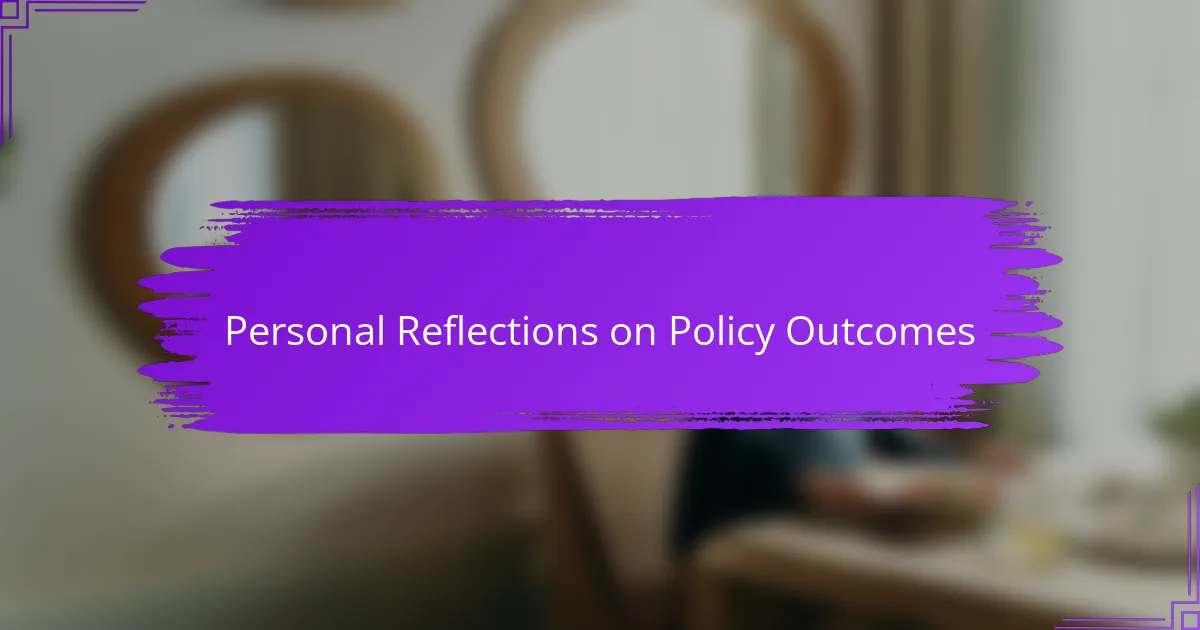
Personal Reflections on Policy Outcomes
Reflecting on the outcomes of Obama’s policies, I often think about the ripple effects that went beyond statistics. When I talk to friends who gained access to healthcare or found stability in tough job markets, their stories remind me that policy is ultimately about people’s everyday lives. Have you ever considered how those broad government decisions translate into moments of relief or hope for individuals?
What resonates with me most is the imperfect yet earnest attempt to address deep-rooted challenges. I recall feeling both frustration and admiration—frustration because no policy can solve everything, and admiration because the commitment to progress felt genuine. Doesn’t that tension between idealism and reality make these outcomes more relatable and even inspiring?
Sometimes I wonder how differently things might have turned out if certain policies had been pushed further or implemented differently. Yet, even with those what-ifs, I can’t help but appreciate the positive changes that became part of our community’s narrative. Have you noticed how these policy results continue to shape conversations and connections among us supporters?
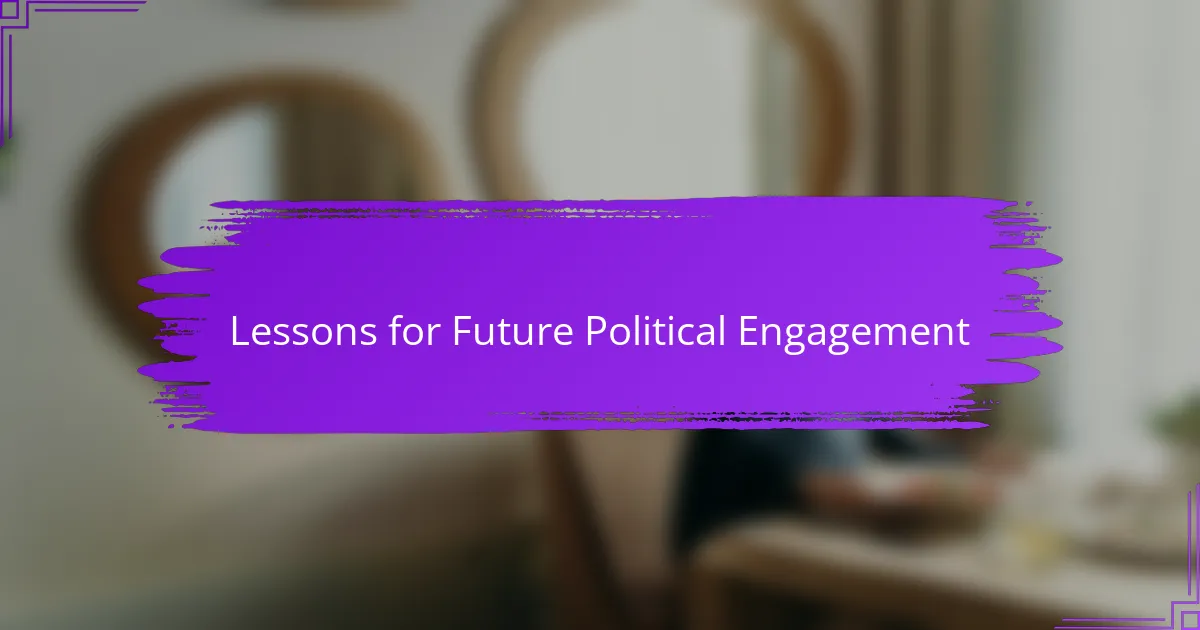
Lessons for Future Political Engagement
Engaging politically isn’t just about casting a vote; it’s about understanding the power of persistent, hopeful participation. I’ve learned that staying informed and involved—whether through community discussions or supporting key initiatives—creates momentum that can’t be ignored. Have you found that small efforts, like sharing your perspective or volunteering, sometimes lead to bigger changes than expected?
From my experience, building bridges rather than walls in political conversations is crucial. Obama’s style showed me the value of empathy and listening, even when opinions differ sharply. Doesn’t it feel more rewarding when dialogue leads to common ground instead of division?
Lastly, I realize that patience matters a lot. Change rarely happens overnight, and setbacks can be disheartening. Yet, keeping faith in the process and focusing on long-term goals has helped me stay motivated. How do you stay encouraged when progress seems slow? For me, remembering the tangible lives affected keeps that fire burning.
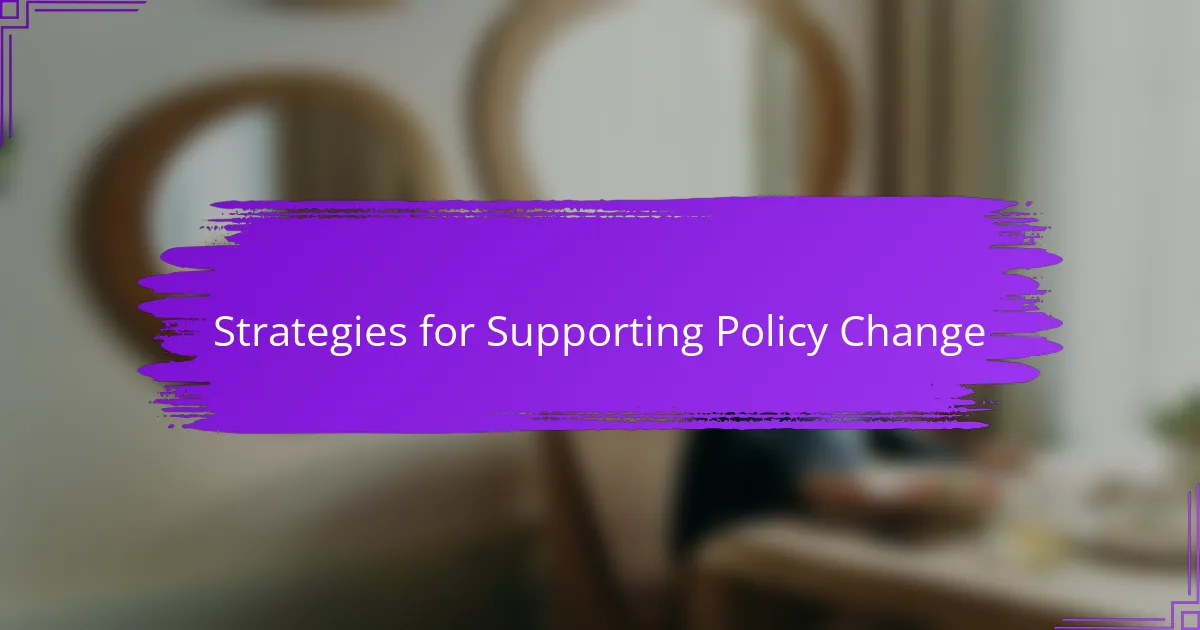
Strategies for Supporting Policy Change
Supporting meaningful policy change requires more than just agreement—it demands active involvement. I’ve found that the most effective strategy starts with educating yourself and those around you; understanding the nuances of a policy equips us to speak authentically and persuasively. Have you noticed how sharing a personal story tied to a policy often resonates more than facts alone? It certainly has helped me connect with others on a deeper level.
Building coalitions is another key piece of the puzzle. In my experience, creating alliances with diverse groups—even those with slightly different priorities—can amplify our collective voice. When I participated in local forums, seeing how united efforts influenced decision-makers was both inspiring and empowering. Doesn’t it feel more impactful when you realize you’re part of a larger community pushing for the same goal?
Finally, persistence is essential. Policy change rarely happens quickly or easily, and I’ve often been reminded that setbacks are part of the journey. Staying hopeful and committed, even when progress seems slow, keeps the momentum alive. How do you stay motivated when obstacles appear? For me, hearing about real people whose lives improved because of these policies is the fuel that keeps me going.
